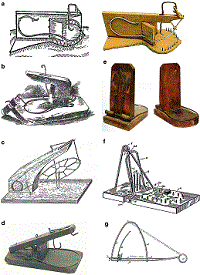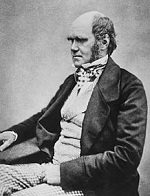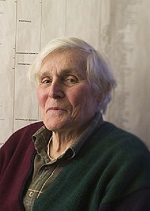|
TRANSLATE THIS ARTICLE
Integral World: Exploring Theories of Everything
An independent forum for a critical discussion of the integral philosophy of Ken Wilber
  Frank Visser, graduated as a psychologist of culture and religion, founded IntegralWorld in 1997. He worked as production manager for various publishing houses and as service manager for various internet companies and lives in Amsterdam. Books: Ken Wilber: Thought as Passion (SUNY, 2003), and The Corona Conspiracy: Combatting Disinformation about the Coronavirus (Kindle, 2020). Frank Visser, graduated as a psychologist of culture and religion, founded IntegralWorld in 1997. He worked as production manager for various publishing houses and as service manager for various internet companies and lives in Amsterdam. Books: Ken Wilber: Thought as Passion (SUNY, 2003), and The Corona Conspiracy: Combatting Disinformation about the Coronavirus (Kindle, 2020). Ken Wilber's CreationismThe Invisible Supernatural Hand of ErosFrank VisserWho owns the argument from improbability? Statistical improbability is the old standby, the creaking warhorse of all creationists from naive Bible-jocks who don't know any better, to comparatively well-educated Intelligent Design "theorists", who should. There is no other creationist argument… —Richard Dawkins[1]
So the "deadlock" (Marshall) is not between Darwin and Design, but between Chance and Design. Darwin is not the problem.
Is Ken Wilber (some kind of) a creationist? Of course he is. This should have been clear from his very first book The Spectrum of Consciousness (1977), where Spirit/Mind is the beginning and end of all existence. Even in his post-metaphysical phase, which started around 2000, he sees Spirit as the Ground of all Being. Not only that, he sees evolution as "Spirit-in-Action". His view of Spirit is therefore not a passive one, as is the case in many Eastern traditions, but a very active one. Spirit really makes a difference in this world. In this spiritual worldview, evolution is driven by an "impulse" (Andrew Cohen) or "impetus" (Steve Taylor) or "Eros" (Ken Wilber)—the name itself doesn't matter. According to these authors, without this drive, not much could be accomplished in terms of evolution to higher complexity and consciousness, because chance would rule supreme. In the Wilberian universe, it is not simply that this spiritual vision is merely in the mystical eye of the beholder (who alone can see this with his "Eye of Spirit", as Brad Reynolds recently mistakenly argued in three long essays [2] criticizing Integral World), for Wilber explicitly and on many occasions claims that his view of things offers a better explanation than science is able to provide. Here's a typical example:
Now, of course, you are perfectly free to believe in evolution and reject the notion of involution. I find that an incoherent position; nonetheless, you can still embrace everything in the following pages about the evolution of culture and consciousness, and reject or remain agnostic on involution. But the notion of a prior involutionary force does much to help with the otherwise impenetrable puzzles of Darwinian evolution, which has tried, ever so un-successfully, to explain why dirt would get up and eventually start writing poetry. But the notion of evolution as Eros, or Spirit-in-action, performing, as Whitehead put it, throughout the world by gently persuasion toward love, goes a long way to explaining the inexorable unfolding from matter to bodies to minds to souls to Spirit's own Self-recognition. Eros, or Spirit-in-action, is a rubber band around your neck and mine, pulling us all back home. (The Collected Works of Ken Wilber, 1999, p. 12)
Here is clearly a definite knowledge claim, of superior knowledge, when compared to what science has to offer, and not just a poetic vision. How does Wilber justify that claim? And does it really explain anything at all?
Creationism is the religious belief that the universe and life originated from specific acts of divine creation, as opposed to through natural processes, such as evolution. (en.oxforddictionaries.com)
Creationists are in the same predicament as Wilber. They downplay what science can accomplish, by claiming that organisms and their organs, or even molecules and their intricate connections, are too complex ("irreducibly complex" is the term introduced by Michael Behe in his Darwin's Black Box (1996), which was highly recommended by Wilber) to have been evolved along Darwinians lines. Wilber explicitly offers help to explain the "otherwise impenetrable puzzles of Darwinian evolution", which Darwinism "ever so un-successfully" has failed to solve. Ironically, the "explanations" offered by creationists like Behe and Wilber turn out to be empty of content. All they can do is point to areas where science has not yet found conclusive answers. Their approach is necessarily negative, not positive. Or we might say, it is inferential. One other creationist book, written by William Dembski, is aptly called The Design Inference (1998). Much more is not possible for authors with spiritual or fundamentalist agendas. For nobody knows how Spirit or God operates. When natural theologian William Paley (1743–1805) famously found his watch on the heath he reasoned, that this object is so complex and fine-tuned for some purpose, it had to be the result of (human) intelligent design. By analogy, he claimed the human eye is likewise too complex to have been evolved by natural means, and must have been the result of (supernatural) intelligent design. But what knowledge does that bring us? Niall Shanks (God, the Devil and Darwin, p. 167) gives a nice illustration of the massive vacuity of the creationist explanation when it comes to details. He challenges Intelligent Design proponents to answer the following "intelligent design questions": (1) What is it? (2) Who made it?, (3) When was it made? (4) How was it made? (5) For what purpose? Here's what we get when we compare human intelligent design with supernatural intelligent design: many unknowns and even unknowables.
Table 1. Natural and supernatural Intelligent Design compared as to their capacity to answer relevant questions about how things came to be.
Michael Behe's favorite mouse trap example is discussed extensively by Shanks as well. Behe claimed that a mouse trap works only when all its components are present at the same time. If one or more components are taken away, the trap no longer works. Likewise, "irreducibly complex" human organs or molecular processes can only work when all components are present at the same time. Therefore, Behe reasons, they must have been "designed". But Shanks counters this by introducing the intruiging concept of "redundant complexity". Many biochemical pathways follow intricate trajectories which offer alternatives, when for some reason the proper enzymes are not available. So lacking a component might not be fatal after all, which opens to the doors to an evolutionary history. Ironically, even the mouse trap has an evolutionary history of its own. Earlier attempts at catching mice with a device were much simpler, and many options have been tried out, over many years, before the standard model was agreed upon. Admittedly, this process was guided by "human intelligent design". But perhaps this whole analogy with machines and human artifacts is misleading, when it comes to understanding evolved organic reality (another fine point made by Shanks). We have not been assembled from different parts (eyes, nose, ears, are not just put together to form a head), we have developed from more primitive life forms, starting with a single cell. So what is supposed to be "designed" here: the final form, the intermediate forms, the first human cell, or something that can evolve to all of that? Intelligent Design doesn't tell us. There is therefore a deep dishonesty involved in these creationist attempts at discrediting science. Nothing is clarified, specified or explained because no insight is given into how the supposed spiritual Power or Force or Person could possibly have managed to produce the complexities of nature. Talking about "design" is fancy and sexy, until it comes down to the implementation of that design. Does Spirit tweak genes here and there, to produce favorable mutations? Does Eros manage to create different species, such as the black bear and the polar bear? Does Shakti monitor cell divisions, so everything runs smoothly at that level? How could that possibly work? Not only is that a task of immense proportions, it doesn't even have a shimmer of plausibility. We might, just as well, therefore turn Wilber's argument on its head by saying that the collective efforts of science "go a long way" to explaining the emergence of complexity, which spiritual approaches have "ever so un-successfully" tried to clarify by introducing unknown and unknowable entities. Science did not reject the notions of elan vital or phlogiston or caloric theory or whatever ancient notion cherished for centuries because it held on to a materialistic and naturalistic ideology—this being the standard claim of spiritually minded authors—but because these concepts turned out to be unhelpful and inferior to scientific concepts which replaced them. A methodological naturalism turns out, again and again, to deliver the goods, when it comes to explaining the complexities of nature. Spiritual alternatives fail miserably. BEATING THE ODDS OF CHANCECreationists often use statistical arguments to validate their view that we need "some" spiritual explanation for the complexity of nature, simply because these complexities are, well… too complex. Too complex to have been evolved, even given the billions of earthly existence. Wilber, like all creationists, is particularly fond of these "arguments":
Calculations done by scientists from Fred Hoyle to F.B. Salisbury consistently show that twelve billion years isn't enough to produce even a single enzyme by chance. (Sex, Ecology, Spirituality, 1996, p. 26)
And more recently, quoting "progressive creationist" Hugh Ross, there is:
less than 1 chance in 10144 (trillion trillion trillion trillion trillion trillion trillion trillion trillion trillion trillion trillion) exists that even one such planet [a planet that supports life] would occur anywhere in the universe. (The Religion of Tomorrow, 2017, p. 497-8)
Do we get a balanced and well-reasoned description of the problem here? No, just a stray quote from a creationist to settle the matter. Scientific positions as to the rarity of life in the universe range from "life is a fluke" to "life is everywhere". So Wilber seems to have forgotten his maxim "everyone is right" here. Why? Because it supports his spiritual agenda which is to offer "something other than chance". When creationists oppose neo-Darwinism they often use this strawman: science explains everything by chance, and since life is very unlikely to have originated and evolved by chance, something else is needed to explain these phenomena (be it Jehova or Eros—the logic of the argument is the same). Fortunately, science does not only rely on chance, far from it. There is so much more sophistication to be had from elementary Talk Origins web pages on "Evolution and Chance" or "Five Major Misconceptions about Evolution", than anything you will ever find in Wilber's writings.
Intelligent Design. The theory that life, or the universe, cannot have arisen by chance and was designed and created by some intelligent entity.. (en.oxforddictionaries.com)
Wilber, of course, doesn't want to associate himself with fundamentalist creationists such as Behe and Ross, so he suggests a third way between neo-Darwinism on the one hand and fundamentalist creationism on the other (of which there are many varieties). But he strategically sides with Intelligent Design when it comes to pointing out the shortcomings of neo-Darwinism. In a rather flippant online quote he stated:
The problem is that creation scientists—who are almost entirely Christians—after having convincingly demonstrated that neo-Darwinian theory has loopholes large enough to drive several Hummers through—then try to prove that Jehovah is in one of the Hummers. (Vomitting confetti, Friday, May 27, 2005)
And on a slightly more serious note, in a footnote (!) in Integral Spirituality (2006) he clarified his position in this field as follows:
To say that the manifest universe is evolving is not necessarily to endorse all of the neo-Darwinian view of evolution.… [W]hat we don't understand about the mechanisms of evolution could fill the Library of Congress several times over. I'm no fan of Intelligent Design either, which is just Creation Science in drag. But you don't need an intelligent designer to realize that evolution seems to involve some "creative allure," or what Whitehead would call "the creative advance into novelty." That drive—Eros by any other name—seems a perfectly reasonable conclusion, given the facts of evolution as we [sic] understand them. Let's just say there is plenty of room for a Kosmos of Eros. (p. 236, foootnote)
For sure, we still don't understand everything about evolution, but what we do understand is not something Ken Wilber will inform you about. Wilber's explanation of evolution seems to boil down to some sort of unspecified creative impulse (we might call him a "creativist" instead of a "creationist"). But saying "there is creativity" is as uninformative as saying "intelligence exists". However, voicing objections to strict neo-Darwinism doesn't equal promoting a spiritual worldview. Within the biological community opinions vary as to the precise weight that should be given to natural selection to explain the diversity of nature. Some think other naturalistic processes are relevant as well. So we need to tease apart legitimate criticism from ideological criticism. “THE THIRD WAY”: BIOLOGY OR POLITICS?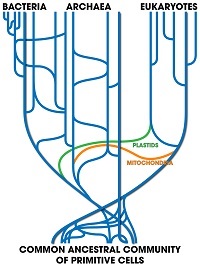 Tree of life showing vertical and horizontal gene transfers In Evolution 2.0 - Breaking the Deadlock Between Darwin and Design (2015), written by creationist and Internet guru Perry Marshall, which I reviewed on Integral World a while ago[3], such a third way is attempted. Not surprisingly, Darwinism (especially "Dawkinsism"—my phrase) is strongly criticized in this volume, but (surprisingly) not with the goal to introduce unseen spiritual factors. Instead, he covers many "alternative" biological schools of thought, such as: transposition, endosymbiosis, epigenetics, horizontal gene transfer, genome duplication and viral transduction. He could have added self-organization and self-assembly to the mix as well. This would all fit nicely into any "integral biology" textbook that tries to remain above sectarian differences. At the same time, Marshall believes that God created the universe for us to explore. But he doesn't seem to use Him as an explanation (except perhaps as the Programmer of the, otherwise unexplainable DNA-code): Let's try a new rhythm: Let's propose that God (or a supremely powerful being, if that makes you more comfortable) made a rabbit hole so deep, we don't know how far it goes. We only know there's always more to discover. And that's how we break the deadlock between Darwin and Design. (p. 260) Another alternative to neo-Darwinism is the so-called "The Third Way" movement in biology. From its mission statement: "Neo-Darwinism ignores important rapid evolutionary processes such as symbiogenesis, horizontal DNA transfer, action of mobile DNA and epigenetic modifications." There is considerable overlap with the territory covered by Marshall. Some contributors to this website might harbor a spiritual worldview, but this is definitely not a dominant feature of this movement. This whole landscape of the various schools of thought, both scientific and religious, is often demarcated along the following lines (and so does Ken Wilber): 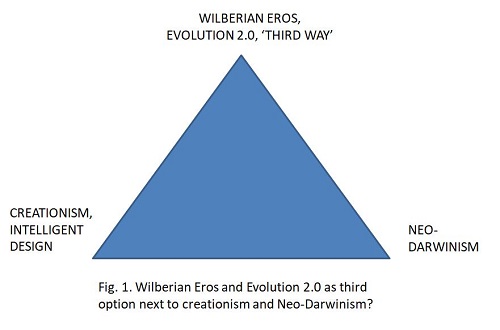 But a much more workable division would be one that recognizes that neo-Darwinism is itself a "third way" between creationism, Intelligent Design and alternative spiritual approaches on the one hand, and a random-chance-only view of evolution on the other (which is a strawman of creationists nobody believes in). For in the scientific view, evolution is never a matter of random-chance-alone. There are always other naturalistic processes in play that counterbalance the workings of pure chance. For any creationist, it is either chance or God/Spirit. Science has exposed the error in that logic. Both chance and design are theoretically empty notions. Therefore we don't need to mix Darwin and Design. We need to avoid both chance and design to make further progress at all along Darwinian lines. So the "deadlock" (Marshall) is not between Darwin and Design, but between Chance and Design. Darwin is not the problem. That dichotomy leads nowhere. In fact, Darwin is still the base of all further evolutionary schools. The Tree of Life may be "tangled" these days (see David Quammen's The Tangled Tree), but it is still a tree. All later schools don't contradict Darwin, they only enrich the picture we have on nature and its complexities. So-called alternatives for neo-Darwinism are often hyped by the popular press as refutations or revolutions, but they don't change the general picture. In general, what Charles Darwin did for the origin of species, Lynn Margulis did for kingdoms (animals, plants, fungi). She did not ask how animal species evolve from previous species, but how animals arose in the first place. She probed deeper (or higher) in the taxonomy of life. And Carl Woese did the same for domains (bacteria, archaea, eukaryotes). Yet again another deeper (or higher) level to be clarified. There is no competition. They address different layers in the spectrum of evolution. So we need a slightly different arrangement: 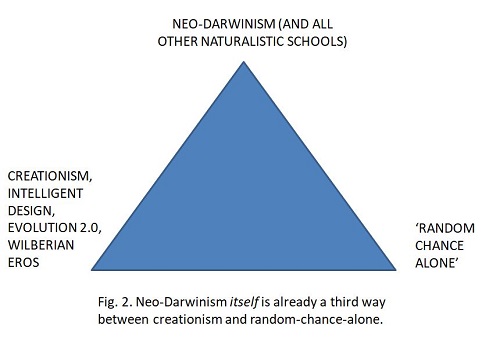 This way, spiritual approaches to evolution—including that of Ken Wilber and Perry Marshall—are clearly seen for what they are: varieties of creationism. They only differ in the way Divinity is conceptualized. In the middle we find all naturalistic schools of biological thought (and this, as said, is covered in Marshall's book as well). This leads us to the following historical overview of evolutionary biology: 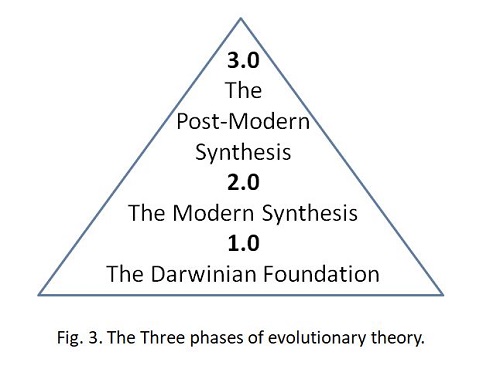 Roughly speaking, in the second half of the 19th century, the Darwinian foundation was laid down. It remains the foundation for all naturalistic schools of biological thought to this very day. But in the first half of the 20th century the so-called "Modern Synthesis" was created, in which (among other things) Darwin was integrated with Mendel's insights about heredity. In the second half of the 20th century, however, a so-called "Extended Evolutionary Synthesis" or "Post-Modern Synthesis" was suggested by several authors. True to the postmodern spirit, its boundaries are fluid, and there is controversy about what to include or exclude. But all post-Darwinian offshoots can be seen as branches sprouting from the same Darwinian trunk. Some of these later investigators addressed different taxonomic levels, as the following diagram and table show:
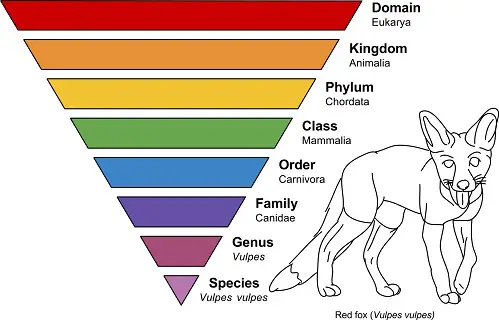
Fig. 4 The major taxonomic ranks applied to the red fox, Vulpes vulpes.
Table 2. In 150 years, evolutionary biology has expanded its research from the origin of species to the origin of kingdoms and domains.
So what Darwin (left) did for species, Sean B. Carroll did for classes, Lynn Margulis (middle) did for kingdoms (animals, plants, fungi) and Carl Woese (right) did for domains (bacteria, archaea, eukaryotes) and Stuart Kauffman might do for the origin of life itself. They digged deeper into the mysteries of nature than Darwin was able to do at his time. But at no point did they invalidate his deep and hard-won conviction that you can get to species without a Creator—or Spirit for that matter. All of them were naturalists, Darwinists and secularists. All were addressing different bands of the Spectrum of Life on earth. A true Integral Biology can be built on these foundations. EXPANDING THE SCOPE OF DARWINISMIn the end, all creationists are set apart in that they believe in some form of "guided evolution"—if they believe in evolution at all, of course. Although there is a wide variety of members of this community, they all have in common that their Spirit/God is seen as being behind all phenomena. They also share the same vagueness about how exactly Divinity operates in nature. In stark contrast, naturalistic schools of evolution believe natural forces and mechanisms in itself are sufficient to explain the varieties of biological existence. The naturalistic position is much, much more economical when it comes to explanatory principles. Compare the work to be done by God in creating each and every species to the simplicity of one evolutionary algorithm: variation plus selection plus inheritance equals evolution. 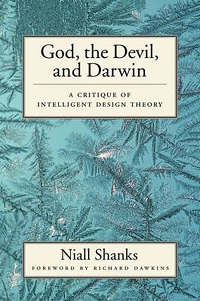
Yes, there is every reason to widen the scope of neo-Darwinism, if the empirical facts require this, so other naturalistic processes are acknowledged as well. This still remains within the domain of science, and is in no way an argument in favor of a spiritual view of evolution, in which invisible factors are postulated, but never specified. One can recognize a creationist as one who sees healthy controversy within a scientific discipline as proof for a spiritual view of evolution. Ken Wilber is definitely one of these. His treatment of biological evolution has been terribly superficial and uninformed. Even creationists like Perry Marshall can teach him about that subject. Shanks provides a nice economic metaphor for how a complex environment of interactions can be the result of unplanned and unintended forces, or self-organization: "The good effects result from self-organization—that is, the invisible hand of economic mechanisms operating in accord with the laws of supply and demand." (p. 45) In the famous words of Adam Smith, who introduced this notion of an invisible hand: "It is not from the benevolence of the butcher, the brewer, or the baker that we expect our dinner, but from their regard to their own interest." Could it be that evolution works the same way? It is not from the will of the animals that eyes and wings are evolved, but from their struggle to survive? Eros would then be such an Invisible Supernatural Hand of evolution. A metaphor, not for a spiritual reality but a naturalistic process. Invisible and non-existent—even though that is hard to believe at first sight for those who want to see Spirit-in-Action.. NOTES[1] Foreword to: Niall Shanks, God, the Devil and Darwin: A Critique of Intelligent Design Theory, Oxford University Press, 2004. A superb introduction into this field, which also contains illuminating discussions of entropy, thermodynamics, self-organization, biological and cosmological fine-tuning, Wilber could learn from—but that is a different story... [2] Brad Reynolds, "Real Integral vs. Fake Integral, Transcending-Yet-Including the Knowledge of Science", Part One, Part Two, Part Three, www.integralworld.net, February 2019. [3] Frank Visser, "DNA as Proof for God's Existence? Review of Perry Marshall's "Evolution 2.0: Breaking the Deadlock Between Darwin and Design"", www.integralworld.net, January 2017. FURTHER READINGFrank Visser, Demystifying Evolution, How do Creationism, Darwinism and Integralism Compare?, March 2015, www.integralworld.net David Lane, Frisky Dirt, Why Ken Wilbers New Creationism is Pseudo-Science, January 2011, www.integralworld.net David Lane & Andrea Diem-Lane, Random Mutations in Molecular Biology, Why Ken Wilber's Creationist Hummer Got Recalled, January 2011, www.integralworld.net David Lane, The Creationist Confusion, Conflating Patterns with Codes, November 2017, www.integralworld.net Andrea Diem-Lane, Novelistic Truth, Comparing Ken Wilber's Eros Theory with Dan Brown's Latest Fictional Narrative, "Origin", October 2017, www.integralworld.net
|
